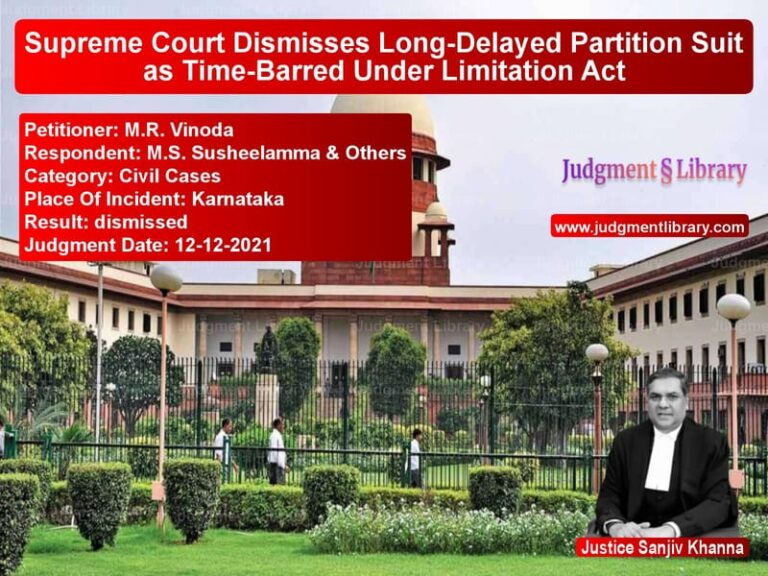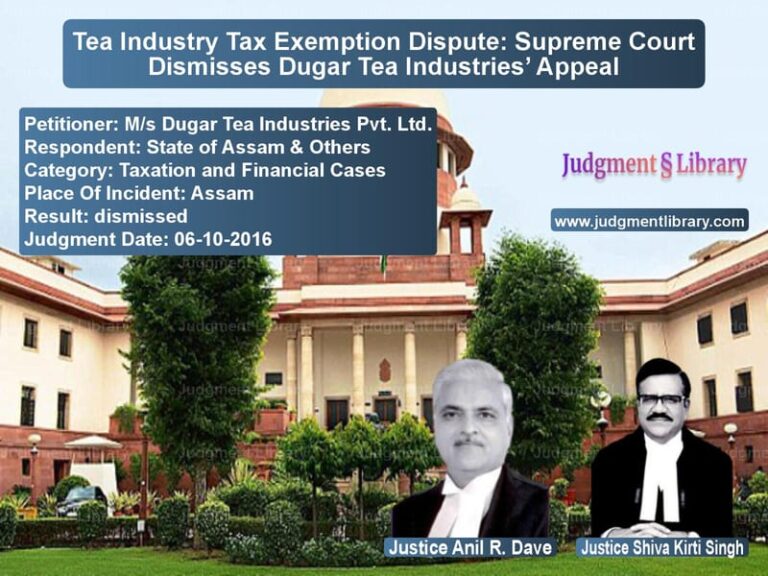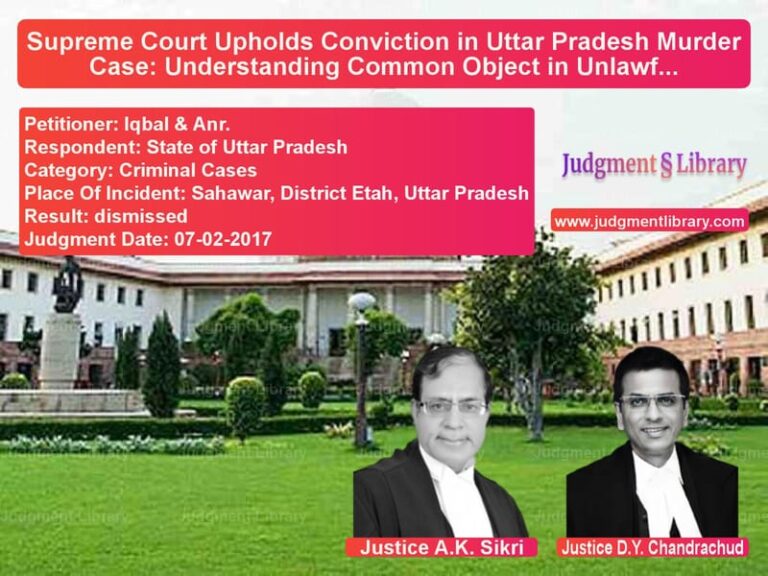Supreme Court Resolves Family Property Dispute: Kamla Nagar and Malcha Marg Properties
The Supreme Court of India recently delivered a crucial judgment in the case of Jugal Kishore Khanna (D) Thr LRs & Anr. v. Sudhir Khanna & Ors., which revolved around a long-standing family property dispute concerning two properties—Kamla Nagar and Malcha Marg. The case highlighted complex issues of ancestral ownership, family settlements, and legal interpretations of partition claims.
The dispute stemmed from the lineage of Late Shri Tek Chand Khanna, whose two sons, Roop Kishore Khanna (RKK) and Attar Chand Khanna (ACK), laid claims to these properties. While RKK’s descendants (the appellants) argued for their exclusive ownership of the Kamla Nagar property, ACK’s legal heirs (the respondents) contended their right to a share. The Supreme Court’s ruling clarified these claims, resolving decades-long litigation.
Petitioners’ Arguments
The appellants, legal heirs of RKK, presented the following key arguments:
- The Kamla Nagar property was originally a joint family property but was later settled through a family arrangement in 1979, where ACK’s share was bought for Rs. 55,000.
- The Malcha Marg property was never a joint family asset and was solely acquired by RKK, thus not subject to partition.
- The payment made to ACK’s heirs was acknowledged through cross-examination of the respondents, reinforcing that they had no further claim over Kamla Nagar.
- The High Court erred in overturning the Trial Court’s ruling, which had correctly held that the Kamla Nagar property exclusively belonged to RKK’s descendants.
Respondents’ Arguments
The respondents, representing ACK’s legal heirs, countered with the following points:
- The payment of Rs. 55,000 was never conclusively linked to a full and final settlement regarding Kamla Nagar.
- No formal document proving a legal transfer of property rights was presented, making the settlement claim invalid under the Registration Act, 1908.
- The Trial Court wrongly relied on family testimonies without considering the legal requirement for registered documentation in property transfers.
- The High Court’s decision correctly rectified the Trial Court’s oversight by affirming that ACK’s heirs retained a 50% share in Kamla Nagar.
Supreme Court’s Observations
The Supreme Court carefully analyzed both properties separately and made key observations:
- Kamla Nagar Property: The Court found merit in the appellants’ claim that Rs. 55,000 was indeed paid to ACK’s heirs as part of a family settlement. The lack of any challenge from ACK during his lifetime further strengthened their case.
- Malcha Marg Property: The Court upheld concurrent findings by the Trial Court and High Court that this property was not part of joint family assets and belonged solely to ACK’s descendants.
- Legal Documentation: The Court noted that while formal registration is preferable, family settlements do not always follow strict documentation requirements.
- Time Lapse: The respondents had never asserted their claims until 1983, reinforcing that no genuine dispute existed before then.
Key Judicial Remarks
In its final ruling, the Supreme Court made several significant remarks:
“There is nothing on record to indicate that the Rs. 55,000 paid by the appellants’ side was for any purpose other than the settlement of property rights. The long passage of time without any contrary claims supports this conclusion.”
On the Malcha Marg property, the Court held:
“No evidence whatsoever suggests that the Malcha Marg property was acquired using joint family funds. Hence, it rightly devolves upon ACK’s legal heirs exclusively.”
Final Judgment
The Supreme Court issued the following verdict:
- The Kamla Nagar property belongs exclusively to the appellants.
- The Malcha Marg property remains under the sole ownership of the respondents.
- The High Court’s judgment was modified accordingly, restoring the Trial Court’s ruling for Kamla Nagar while upholding its decision on Malcha Marg.
- All interim orders were vacated, and the registry was directed to issue a decree sheet reflecting the Court’s decision.
Conclusion
This judgment underscores the importance of family settlements in property disputes and highlights the balance between legal formalities and practical realities in such matters. By resolving a long-pending issue, the Supreme Court reaffirmed the principle that property rights should be settled based on clear intent and factual evidence rather than prolonged litigation.
Petitioner Name: Jugal Kishore Khanna (D) Thr LRs & Anr..Respondent Name: Sudhir Khanna & Ors..Judgment By: Justice Vikram Nath, Justice Ahsanuddin Amanullah.Place Of Incident: Delhi, India.Judgment Date: 19-03-2024.
Don’t miss out on the full details! Download the complete judgment in PDF format below and gain valuable insights instantly!
Download Judgment: jugal-kishore-khanna-vs-sudhir-khanna-&-ors.-supreme-court-of-india-judgment-dated-19-03-2024.pdf
Directly Download Judgment: Directly download this Judgment
See all petitions in Property Disputes
See all petitions in Succession and Wills
See all petitions in Landlord-Tenant Disputes
See all petitions in Judgment by Vikram Nath
See all petitions in Judgment by Ahsanuddin Amanullah
See all petitions in partially allowed
See all petitions in Modified
See all petitions in supreme court of India judgments March 2024
See all petitions in 2024 judgments
See all posts in Civil Cases Category
See all allowed petitions in Civil Cases Category
See all Dismissed petitions in Civil Cases Category
See all partially allowed petitions in Civil Cases Category







